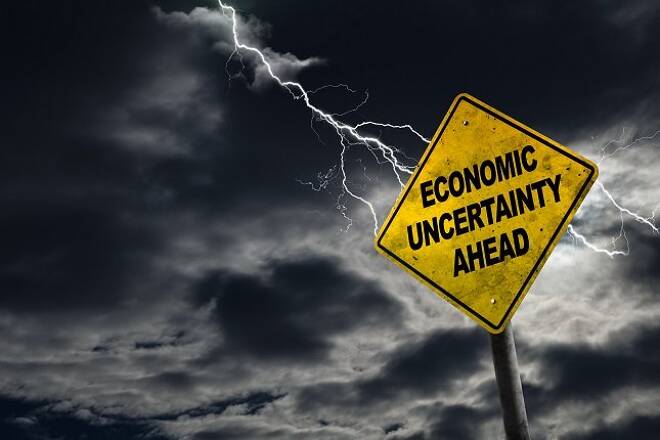Advertisement
Advertisement
What Would War Mean for the Global Economy?
By:
The last week of September saw investors once again turn to safe havens, as North Korea and the U.S entered the ring for yet another war of words.
The last week of September saw investors once again turn to safe havens, as North Korea and the U.S entered the ring for yet another war of words. Geopolitical tensions are an ongoing theme of 2017, and have contributed to keeping investor confidence in USD low, writes Lukman Otunuga, FXTM’s Market Research Analyst.
Comments by North Korea’s Foreign Minister on 25 September accusing the US of “declaring war” sent gold soaring within 24 hours, topping US$1,310. Once the tension between the countries eased, gold prices dropped and currently trading around $1275. In the FX markets, traditional safe havens JPY and CHF appreciated sharply against other major currencies. Back in August, similar tensions saw the weapons and defense company, BAE Systems, gain 1.5% while global equities plummeted. Could the threat of war be enough to galvanize a slowing world economy?
More than one analyst has cited war as a catalyst for economic growth. Increased government spending and reduced unemployment during the Second World War are widely believed to have accelerated recovery from the Great Depression. However, war is not a universal benefactor. Its impact is limited to a few industries, as was evident in August when munitions suppliers like BAE Systems made gains while others declined.
Governments embroiled in war must invest in construction, healthcare and defense equipment as a bare minimum. Increases in public spending initially kick-start economic growth, creating new jobs in these sectors and, in turn, increasing consumer spending on essentials such as food and fuel. But very few governments have the funds available for such an undertaking. Realistically, we’re talking about deficit spending, and a mounting national debt will curtail economic growth. Interest rates on borrowed funds rise as the debt-to-GDP ratio increases, demand for government bonds lessen in response, putting further pressure on interest rates and slowing economic growth.
Capital Economics, an independent research house, recently circulated a note to clients assessing the potential impact a conflict between North Korea and the United States would have on the world economy. The authors noted that post-WWII, countries involved in conflicts typically experience an economic contraction. The conflict on the Korean Peninsula in the 1950s saw South Korea’s GDP decline a staggering 80%, while Syria has lost 60% from its GDP since war broke in March 2011.
The research note suggests that were a conflict to erupt between North Korea and America, the Korean Peninsula would again pay the heaviest price. Since South Korea and North Korea account for 2% and 1% of world GDP respectively, any slowing of their economies would be felt globally. Additionally, South Korea is a car manufacturing hub, the largest producer of LCD screens and home to one of the world’s major shipbuilders. Conflict in the region would interrupt international trading routes and could lead to widespread shortages.
In a world economy more integrated than ever before, war has little economic merit. Short-term, localized benefits are offset by disruptions to international trade routes and increased national debt. The markets may be less motivated by the US Premier’s ill-advised public rants than they were back in January, but investors have not lost sight of the fact that we are currently watching two very dangerous men square up over nuclear codes. Given the climate, the recent dash for safe havens is far from surprising.
For more information, please visit FXTM
About the Author
Lukman Otunugaauthor
Lukman Otunuga is a research analyst at FXTM. A keen follower of macroeconomic events, with a strong professional and academic background in finance, Lukman is well versed in the various factors affecting the currency and commodity markets.
Advertisement
